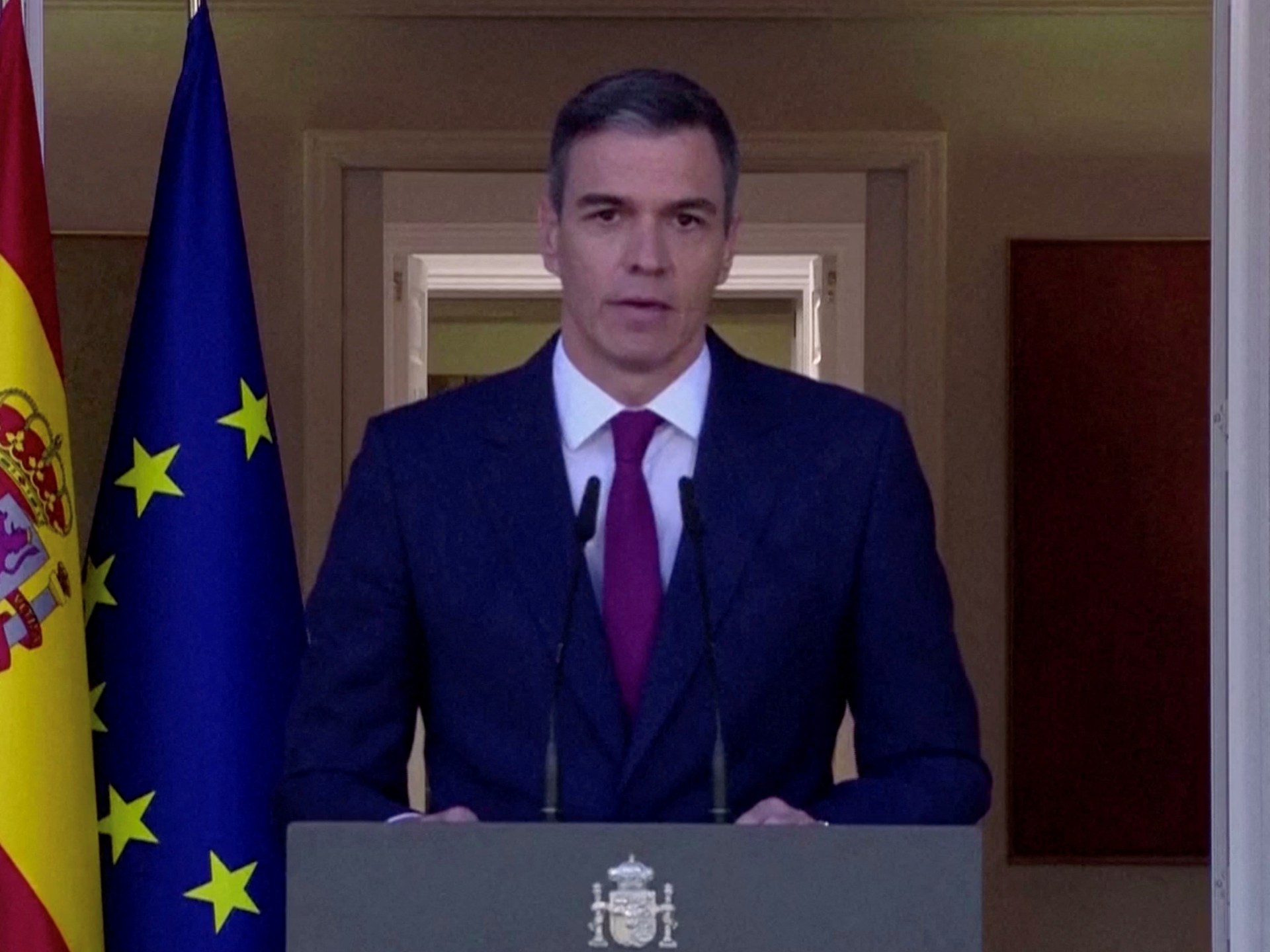
Madrid, Spain – Millions of people in Spain have been glued to their televisions as Prime Minister Pedro Sanchez made a live address to the nation to say he would stay on in charge of the government.
The announcement on Monday ended five days of high tension. Last week, the country appeared rudderless while Sanchez considered his future over a corruption scandal connected to his wife.
“I have decided to continue with even more strength at the helm of the government of Spain. Things are going to be different,” Sanchez said as he stared, grim-faced into the camera.
The premier denied the allegations against his wife, Begona Gomez, and said he and his family have been the target of a campaign of slander by political opponents for a decade.
He also rejected accusations that the five days he spent considering his future in office was politically motivated, saying it was time to reflect on the growing polarisation of Spanish politics.
“For too long we have let this filth corrupt our political and public life with toxic methods that were unimaginable a few years ago. Do we really want this for Spain?” he asked.
“I have acted out of clear conviction: Either we say ‘enough is enough’ or this degradation of public life will define our future and condemn us as a country.”
At the El Padron bar in Madrid, Heracles Sanchez was not impressed.
“This was all a stunt in the end. He kept the whole country waiting while he pretended to be concerned about this court case, and all the time, he was going to carry on as normal,” he told Al Jazeera.
“I think he just wanted to win support for his cause because there are elections coming up. If there is nothing in this court case against his wife, let the court decide.”
Voters head to the polls in key regional elections in Catalonia on May 12 while European parliamentary elections are set for June.
Sanchez has long been a hate figure for elements on the Spanish right who oppose his amnesty deal with Catalan separatists in return for their support for his government and his political links to EH Bildu, a party linked to the defunct Basque separatist group ETA.
Far-right groups have previously held demonstrations outside the Spanish Socialist Workers’ Party headquarters in Madrid for months and battered an effigy of Sanchez.
Pedro J Ramirez, editor of the right-wing online newspaper El Espanol, said Sanchez staged a “political operation”.
“I agree that we need a political regeneration as Sanchez said, but this does not mean we need to restrict judges in what they do by doing this kind of thing,” he told state-run RTVE television.
Across Madrid, Gema Alamar, who runs a software company, took time away from work to grab a coffee and watch Sanchez on television in her local bar.
“I am glad he has stayed. These allegations are clearly nonsense and have been made up by people who want to see Sanchez out of power. They will do anything to harm him,” she told Al Jazeera.
“Our democracy is poisoned by all this nonsense. We need to wake up and realise the difference between democratic debate and politically motivated bile.”
What’s behind the drama?
The drama began on Wednesday when a court in Madrid opened a preliminary investigation into allegations against Gomez by Manos Limpias (Clean Hands), which describes itself as a union but mainly brings legal cases linked to right-wing causes.
The group said in a Facebook post that it based the court case on media reports.
On Thursday, Madrid’s prosecuting authority said it was appealing against the private complaint laid against Gomez for alleged influence peddling and business corruption.
Ana Carmona, a professor of constitutional law at the University of Seville, said she did not believe Sanchez’s words would change the political environment.
“A declaration by the prime minister will not change the polarised political culture in Spain. The country needs real gestures to do that,” she told Al Jazeera.
“What will be key is how the opposition parties and the country react to Sanchez’s words. Perhaps Sanchez should have called for a vote of confidence in parliament. That way it would prompt debate and commitment to how Sanchez is trying to change the political culture,” she said.
Opposition parties have charged that Sanchez taking five days away from his official duties to consider his future was simply a political manoeuvre.
Isabel Ayuso – the populist conservative head of Madrid’s regional government, who is fancied as a possible future prime minister – told reporters: “The only thing he wants is power without control, without counterweights.”
Oriol Bartomeus, a political expert at the Autonomous University of Barcelona, said the climate of political polarisation was not new in Spain, which restored democracy only in 1978 after a long dictatorship.
However, he said Sanchez had learned from history and would go on the attack instead of giving in to pressure.
“I see lots of similarities with a situation here 30 years ago when the then-Socialist government was facing a lot of criticism for corruption scandals and their policy was to resist. I think Sanchez has learned from history, and he is going to go on the attack too.”